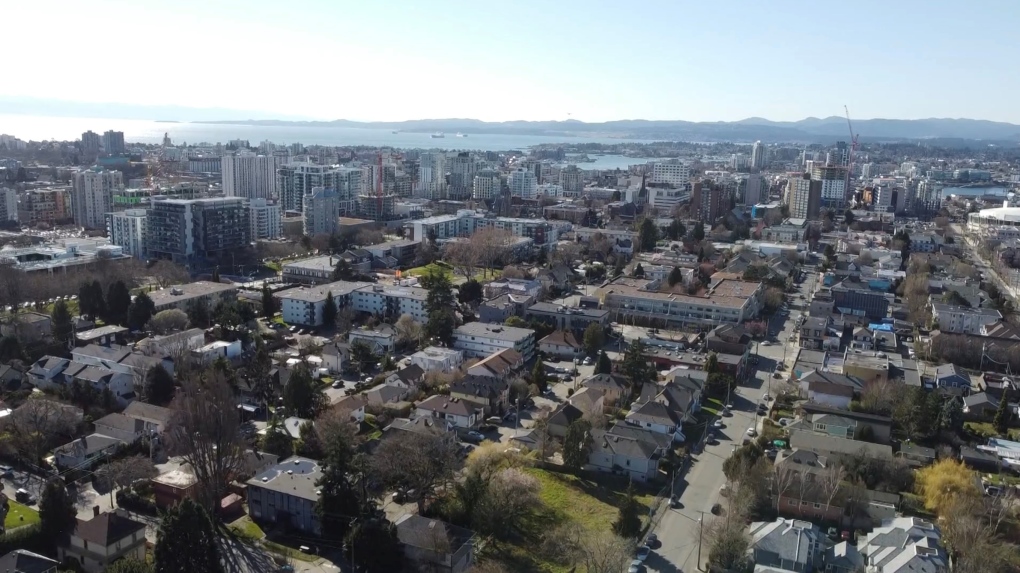Both Vancouver and Victoria saw their warmest Feb. 1 on record Thursday
 An aerial view of downtown Victoria. (CTV News)
An aerial view of downtown Victoria. (CTV News)
The rain and flood advisories have mostly been rescinded and more seasonal temperatures are in the forecast, but this week's atmospheric rivers left another day of record-high temperatures in their wake.
Seven B.C. communities saw their warmest Feb. 1 on record Thursday, including the province's capital and its largest city.
Both Victoria and Vancouver broke records set back in 1941, and only narrowly, according to preliminary data released by Environment and Climate Change Canada.
In Vancouver, the previous record was 13.3 C, and Thursday's high was 13.6 C.
Victoria's previous record for Feb. 1 was 12.8 C, until the mercury hit 13.1 C on Thursday.
The five other records set across the province Thursday were all from more recent years. They were:
- Dease Lake area: New record of 7.9 C, old record of 6.5 C set in 1991
- Puntzi Mountain area: New record of 9.3 C, old record of 7.2 C set in 2005
- Sechelt area: New record of 13.2 C, old record of 12.5 C set in 1998
- Williams Lake area: New record of 9.7 C, old record of 8.1 C set in 1986
- Yoho National Park area: New record of 5.2 C, old record of 5 C set in 1962
ECCC says its temperature records are "derived from a selection of historical stations in each geographic area that were active during the period of record."
Earlier in the week, the warm airmass that accompanied the atmospheric rivers broke dozens of high-temperature records across the province on consecutive days.
The weather pattern also closed the North Shore mountains to skiing and caused flooding in the Sea to Sky region, with the Village of Pemberton declaring a state of local emergency and ordering evacuations for six properties.
The evacuation orders and the state of local emergency have since been lifted.
CTVNews.ca Top Stories

Trump again calls to buy Greenland after eyeing Canada and the Panama Canal
First it was Canada, then the Panama Canal. Now, Donald Trump again wants Greenland.
King Charles ends royal warrants for Ben & Jerry's owner Unilever and Cadbury chocolatiers
King Charles III has ended royal warrants for Cadbury and Unilever, which owns brands including Marmite and Ben & Jerry’s, in a blow to the household names.
LIVE UPDATES Parts of Ontario under snowfall warning Monday as holiday travellers hit the road
Holiday travellers and commuters could be in for a messy drive on Monday morning as a significant round of snowfall moves into the region. Here are live updates on the situation in Toronto.
U.S. House Ethics report finds evidence Matt Gaetz paid thousands for sex and drugs including paying a 17-year-old for sex in 2017
The U.S. House Ethics Committee found evidence that former Rep. Matt Gaetz paid tens of thousands of dollars to women for sex or drugs on at least 20 occasions, including paying a 17-year-old girl for sex in 2017, according to a final draft of the panel's report on the Florida Republican, obtained by CNN.
DEVELOPING Evacuation order issued for Edmonton building where security guard was killed
An apartment building where a security guard was killed earlier this month is being evacuated.
A massive, menacing Steller's sea eagle is dazzling birders in a Newfoundland park
A national park in Newfoundland has made the unusual move of opening in the winter so people can catch a glimpse of its rare and menacing new guest.
Blake Lively gets support from 'It Ends With Us' author and 'Sisterhood of the Traveling Pants' co-stars
Blake Lively is getting some high-profile support in the midst of allegations she's made against her 'It Ends With Us' director and co-star, Justin Baldoni.
Dutch discover rare 500-year old wooden shoe
The Dutch are known worldwide for their wooden shoes, but the recent rare discovery of a 500-year-old one in the city of Alkmaar has shown just how widespread their use once was.
Dozens of luxury condos and hotels in Florida are sinking, study finds
Dozens of luxury condos, hotels and other buildings in southeast Florida are sinking at a surprising rate, researchers reported in a recent study.

































